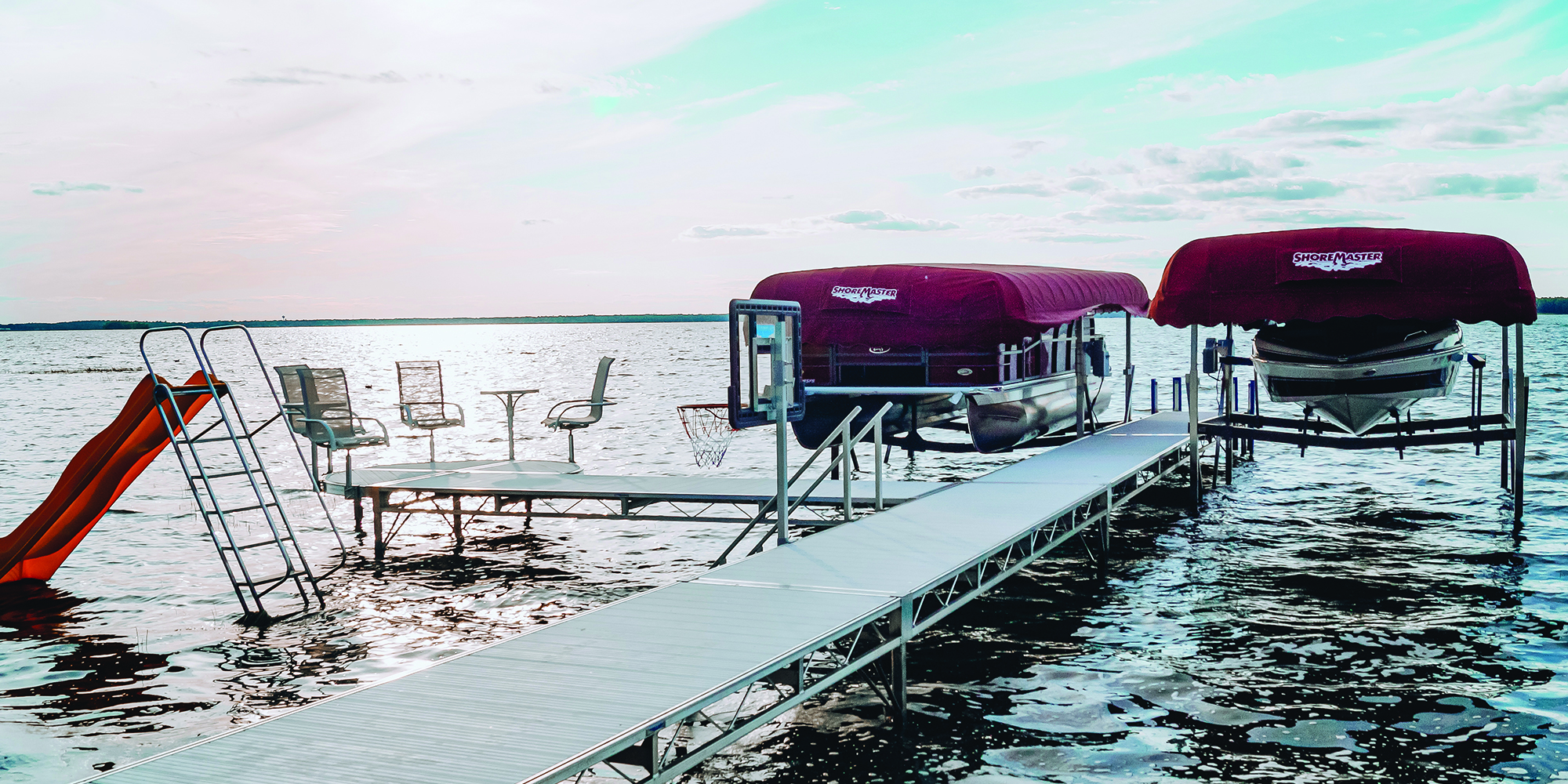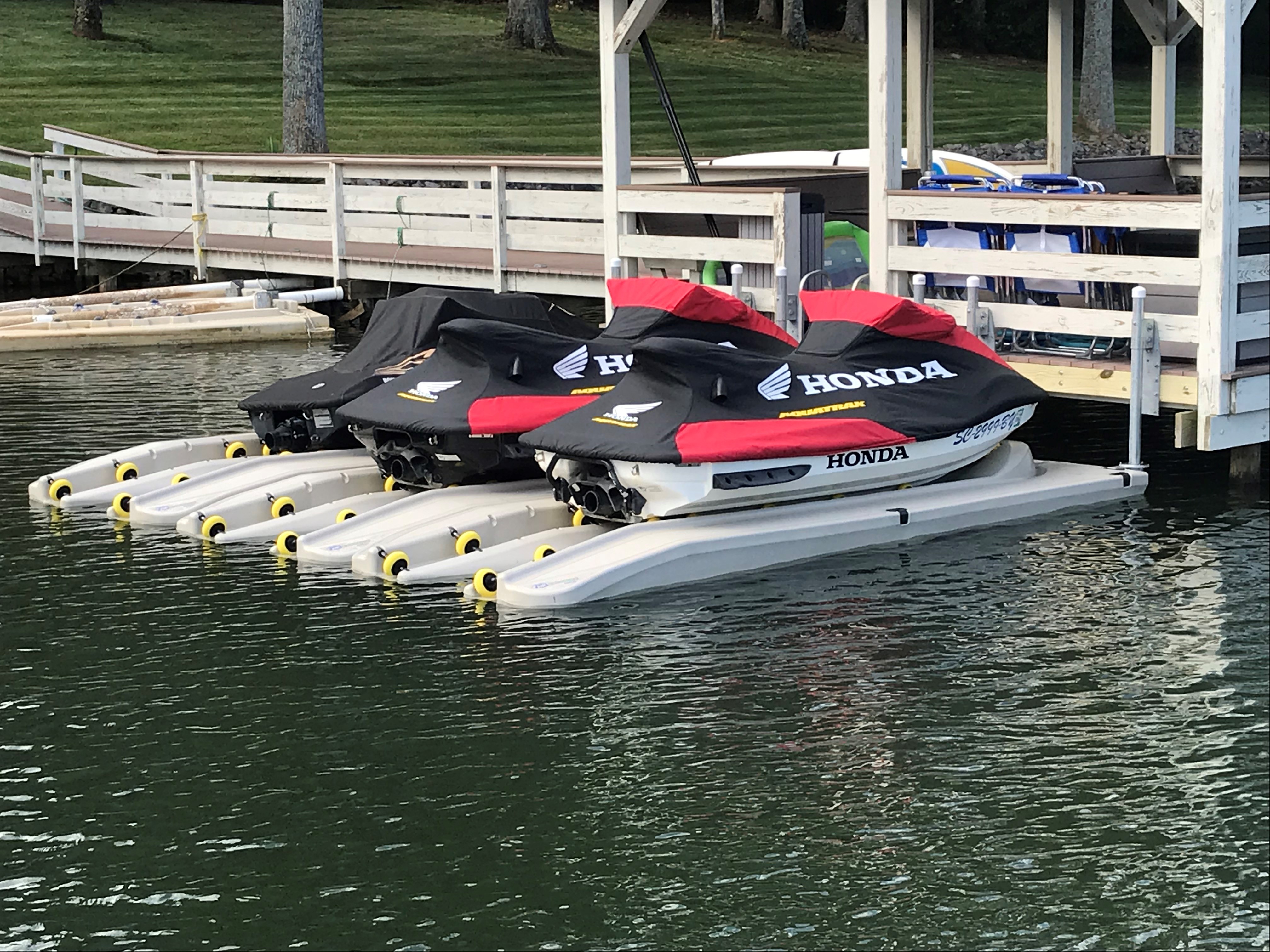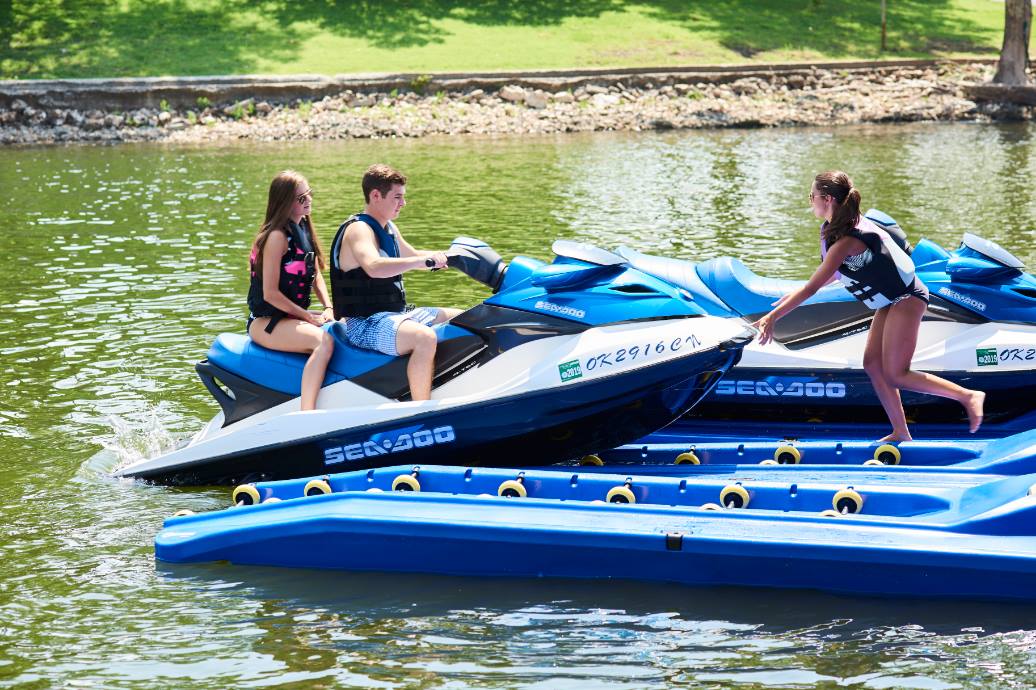May 16, 2024
Types of Boat Docks: What Are the Different Options?
Written by ShoreMaster Marketing
What Are the Different Types of Boat Docks?
Investing in a quality boat dock can be transformative for waterfront property owners. In addition to providing safe and convenient access to boats and personal watercraft (PWC), modern docking solutions extend living spaces, creating outdoor activity and entertainment hubs that elevate waterfront living.
However, choosing the ideal solution can be tricky with the variety of dock types available. Below, we help you navigate the evolving world of boat docks, exploring the different types, their unique advantages, and the factors to consider to make the right choice.

Introduction to Boat Docking Solutions
Boat docks can be broadly categorized into two main types:
- Fixed: Also known as stationary or permanent docks, fixed docks are structures securely anchored to the shoreline or pilings driven into the waterbed. If your shoreline experiences minimal fluctuations in water height and seasonal changes, a fixed dock provides a stable platform for your waterfront activities.
- Removable: Removable docks are a practical choice for areas with fluctuating water levels or locations where installing fixed docks isn't feasible due to deep waters or unstable waterbeds. Some of the most popular removable docks include floating, sectional, and wheel-in docks. These solutions provide the flexibility and adaptability that fixed docks cannot.
Within these categories, there are numerous sub-types, each with its own advantages and ideal applications. Understanding these considerations will enable you to make an informed decision for choosing a docking solution that enhances your waterfront property and the experiences it offers.
Exploring Types of Fixed Docks
Fixed docks are ideal for property owners who don’t foresee changes to their waterfront access. Here’s a closer look at some popular fixed dock options:
- Pile docks: These sturdy structures are supported by driven pilings, typically made of wood, steel, or concrete. Their solid foundation provides exceptional stability, allowing them to handle heavier loads, strong waves, currents, and other environmental forces. Generally, pile docks require firmer ground, as loose sand or silt may cause pilings to shift or sink.
- Crib docks: Typically constructed with wooden frames filled with rocks or gravel, this sturdy structure provides exceptional stability. Crib docks are well-suited for shallow waters with soft bottoms and offer a more rustic aesthetic. However, they can restrict water movement, potentially compromising marine habitats. A 2018 study found that docks can significantly impact salt marsh vegetation, reducing stem density and biomass (Logan, J., Davis, A., Markos, C., & Ford, K., 2018).
- Fixed sectional docks: These dock systems consist of interconnected sections anchored to the shore using posts or legs. Ideal for shallow water or uneven shorelines, these modular docks offer unparalleled versatility and customization compared to most fixed docks.
As the industry leader across nearly every market in North America, we at ShoreMaster pride ourselves on offering premium docking solutions that can evolve with the needs of our customers. Contact us today to learn more about our Infinity Dock System — the most versatile, durable, and user-friendly system on the market.
The Advantages of Floating Docks
Floating docks have emerged as a leading choice for waterfront owners who value versatility and ease of ownership. Unlike permanent docks with fixed heights, these innovative dock systems adapt to fluctuating water levels, providing consistent access regardless of changing waterfront conditions.
Recently, the US government invested $3.72 million to increase research efforts to enhance water level forecasts for the Great Lakes, underscoring the significance of changing water levels. Dr. Debbie Lee, NOAA - Great Lakes Environmental Research Laboratory Director, said, “From commercial shipping operations to recreational activities, a diverse array of stakeholders stands to benefit from enhanced forecasting capabilities, ensuring the sustained well-being of Great Lakes communities .”
Here are the primary advantages of choosing a floating dock:
- Versatility: Aside from adapting to changing water levels, premium floating docks provide a myriad of customization options to suit different requirements and preferences. From different decking options and layout configurations to dock accessories and furniture, our floating docks allow you to transform your waterfront however you wish.
- Ease of installation: Ease of ownership is at the core of floating docks. Compared to fixed docks, which generally involve extensive and costly construction projects, floating docks are significantly easier and quicker to install, remove for seasonal storage, or reconfigure as needs change.
- Low maintenance: Our floating docks are constructed from durable materials such as high-density polyethylene, making them resistant to splintering, rotting, impacts, and UV rays. This eliminates the need for staining, painting, and other treatments often required by wooden docks. Usually, regular cleaning with mild soap and water and checking connections is all it takes to keep ShoreMaster floating docks in optimal condition.
Thinking of adding a floating dock to your waterfront? Contact us today to learn more about this dynamic docking solution. We’ll help assess your shoreline and requirements to help you make the right choice.
Hybrid and Specialty Dock Solutions
At ShoreMaster, we understand that different shorelines and waterfront enthusiasts have different requirements and needs. That’s why we designed three dock systems — sectional, wheel-in, and floating — to ensure every waterfront owner has the optimal docking solution.
Here’s a closer look at some of our premium docking solutions:
- Infinity RS7: With an industry-leading 6.75-inch side rail frame, the Infinity RS7 is one of the most stable docking solutions in the industry. Available as a sectional or wheel-in dock, the Infinity RS7 features our QuickConnect (QC) Dock Assembly System for easy installation, customization, and ownership.
- Infinity TS9: Combining the timeless truss design with superior performance, the Infinity TS9 is perfect for waterfront owners looking for a reliable and easy-to-own docking solution. Also available as a sectional or roll-in system, the Infinity TS9 allows for easy dock installation no matter your shoreline. Meanwhile, the Infinity frame connection system provides a premium, hassle-free, and customizable dock experience.
- RhinoDock Systems: Truss steel frames, premium floatation, decking, and roofing system — you can configure all of these elements any way you want to create a top-of-the-line docking system. Whether you need a multi-level residential dock or a full-service marina with multiple boat slips, choosing RhinoDock ensures you have a versatile dock system with industry-leading strength, superior stability, and exceptional design.
All ShoreMaster Infinity dock models feature superior modern craftsmanship, 5-sided dock legs, and QC assembly, so no matter which model you choose, you know you have a docking system you can depend on season after season. Contact us today to find a local dealer and explore Infinity Dock models.
Choosing the Right Dock for Your Waterfront
Selecting the optimal dock for your waterfront requires careful consideration of several factors, including:
- Waterfront conditions: Assess the available shoreline space, average water depth, bottom composition, typical fluctuation levels, and other seasonal considerations.
- Usage requirements: How do you plan to use your dock? For instance, if you think you’ll need space for entertaining guests in addition to mooring boats, a modular dock system might be the better choice. Meanwhile, a wheel-in dock system might suffice if boat access is the priority.
- Local regulations: Most local governments require authorizations and permits to install docks. These regulations might involve building within certain dimensions and shoreline distances, mooring restrictions, and environmental guidelines.
The perfect dock lets you make the most of your shoreline. ShoreMaster's range of dock types, accessories, and customization options gives you all the tools to shape and reshape your waterfront as your preferences and needs evolve.
For expert advice and personalized recommendations, contact us today. We’ll connect you with knowledgeable local dealers to help you create the perfect waterfront haven for you and your loved ones.
References:
- Logan, J., Davis, A., Markos, C., & Ford, K. (2018). Effects of Docks on Salt Marsh Vegetation: an Evaluation of Ecological Impacts and the Efficacy of Current Design Standards. Estuaries and Coasts, 41, 661-675. https://doi.org/10.1007/s12237-017-0323-1
- Environmental + Energy Leader (Mar 13, 2024). Biden-Harris allocates $3.7M for Great Lakes water forecast enhancement. https://www.environmentenergyleader.com/2024/03/biden-harris-allocates-3-7m-for-great-lakes-water-forecast-enhancement/


